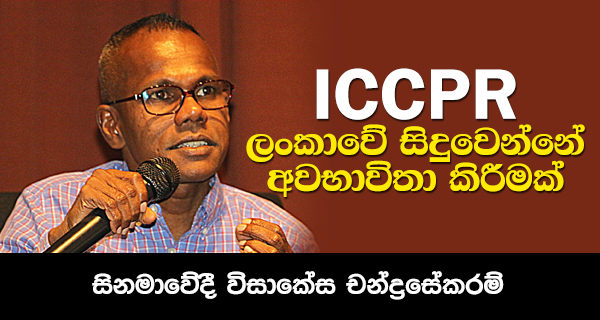It has been more than 8 months since the arrest of a young man named Afnaf Jaseef. He is arrested for writing poetry. As designers, we always express our ideas. If it is obstructed, restricted or subjugated unjustly, we will not be able to create. An example I always cite is that the artist who painted the Sigiriya murals could draw apsaras, and in recent times our filmmakers have won film awards, for example a filmmaker like Lester James Peiris could have won the Rajitha Mayura Award in India because we exercised our right to express these free ideas. Now the repressive laws in Sri Lanka are being used to undermine this right.
ICCPR
Afnaf Kaviya was arrested under the Prevention of Terrorism Act and charged under the ICCPR Act. We need to see for what purpose these laws were actually enacted by Parliament. These laws were enacted to arrest the most serious terrorists and to prevent the spread of serious extremist violence between religions and ethnic groups. Otherwise, it is not to prevent an innocent poet, an innocent speaker, from using a creative way of expressing his ideas. Therefore, I condemn the prejudicial and unjust use of laws imposed for such a serious purpose to suppress the creators of Sri Lanka.
Poets, storytellers, filmmakers, singers and all artists in our country should unite and speak out against the use of these repressive laws against their fellow creators. This could be a Muslim poet today or a Tamil singer tomorrow. It could be a Sinhala filmmaker tomorrow. There are times like that. So we always have to understand that as creators we have to create the environment we need to exercise our copyright very responsibly. We must speak out against all forms of repressive laws and repressive state interventions that hinder it.
complaints
These complaints come from a very small group. Until such a creation is made, there is a group of people who are waiting for such a free idea to be expressed. There are several institutions. They are the ones who come forward. The first thing they do is bring the design out of context and interpret it, calling it a very harmful creation. Secondly, after the complaint is lodged, the police and other government officials call it a very harmful creation. Then these parties try to include the same opinion in the judiciary. One thing we have seen is that many people who criticize these creations and complain against their creations often do not understand the first point after reading them. The second point is that they do not have the discipline to read and understand them and to enjoy literature. The third factor is that their skulls are full of very prejudiced opinions. They have set for themselves some standard that they believe is right, good, and excellent. They want to oppose anyone who speaks freely against it. But I do not think this is the opinion of the majority of the people in our country. This is not the opinion of the people of our country, the opinion of the people of our country is different. The people of our country have accepted many such creations in the past.
If you look at the ICCPR Act, it means that it was introduced in Sri Lanka to implement an international agreement. Most people do not really know what this agreement is about. If you read it, you will understand that the whole agreement is about the civil and political rights of the citizens of our country, which have been agreed upon by all the signatories. There they recognize the freedom of expression, equality and arbitrary detention of citizens in every country. It also recognizes the right to a fair trial in a court of law, the right to live without torture, and the right of a designer to express what he wishes.
Repressive law
But unfortunately the ICCPR Act in our country is not brought to enforce all these rights but to enforce only a select few of these. If we look at the fundamental rights in the Constitution of our country, it is said that the ICCPR Act is a move against the civilized provisions in the Chapter on Fundamental Rights. But unfortunately there are very few times when this is questioned. Now your problem is that when we look at the practical problem faced by those who are arrested because of this, we see something like this. One of the trends we usually see is that good decisions are made when there are judges who have a progressive opinion, no matter how the police act. An example is the dismissal of the case filed against Shakthika Kumara under the ICCPR Act. Even now Shakthi has to face a number of serious problems. We have to face a lot of injustices. What happened to him caused a great deal of inconvenience to his family. Those children are very sad. Not only that, but his fellow artists are scared. I mean who pays for this damage. The problem here is not just months of remand. That is to say, remand in our country is a method to achieve the investigation until the investigation into an offense is completed. It’s not about punishment. But repressive laws, including the ICCPR Act, are meant to be used to prevent and punish the views of progressives, including the creators of remand prison terms provided for this investigation. That is why this is a repressive law in Sri Lanka.
